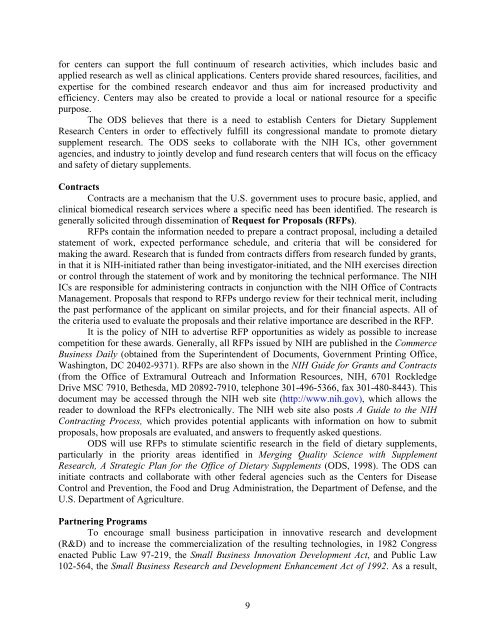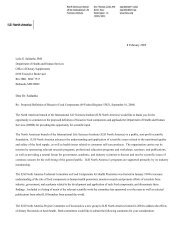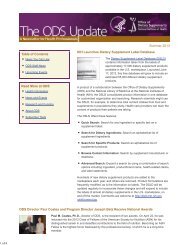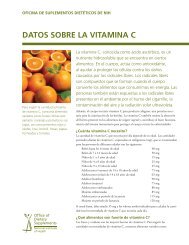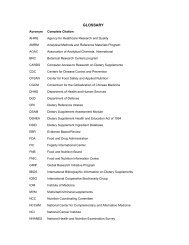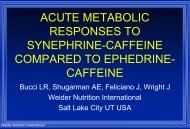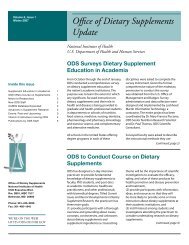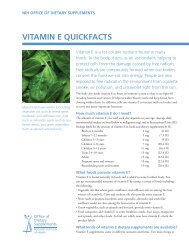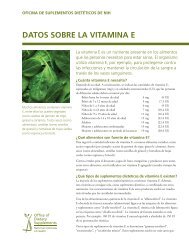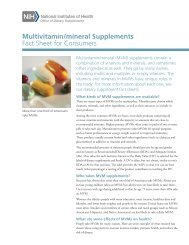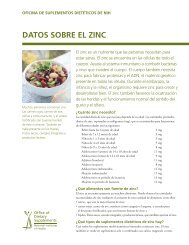status report - Office of Dietary Supplements - National Institutes of ...
status report - Office of Dietary Supplements - National Institutes of ...
status report - Office of Dietary Supplements - National Institutes of ...
Create successful ePaper yourself
Turn your PDF publications into a flip-book with our unique Google optimized e-Paper software.
for centers can support the full continuum <strong>of</strong> research activities, which includes basic and<br />
applied research as well as clinical applications. Centers provide shared resources, facilities, and<br />
expertise for the combined research endeavor and thus aim for increased productivity and<br />
efficiency. Centers may also be created to provide a local or national resource for a specific<br />
purpose.<br />
The ODS believes that there is a need to establish Centers for <strong>Dietary</strong> Supplement<br />
Research Centers in order to effectively fulfill its congressional mandate to promote dietary<br />
supplement research. The ODS seeks to collaborate with the NIH ICs, other government<br />
agencies, and industry to jointly develop and fund research centers that will focus on the efficacy<br />
and safety <strong>of</strong> dietary supplements.<br />
Contracts<br />
Contracts are a mechanism that the U.S. government uses to procure basic, applied, and<br />
clinical biomedical research services where a specific need has been identified. The research is<br />
generally solicited through dissemination <strong>of</strong> Request for Proposals (RFPs).<br />
RFPs contain the information needed to prepare a contract proposal, including a detailed<br />
statement <strong>of</strong> work, expected performance schedule, and criteria that will be considered for<br />
making the award. Research that is funded from contracts differs from research funded by grants,<br />
in that it is NIH-initiated rather than being investigator-initiated, and the NIH exercises direction<br />
or control through the statement <strong>of</strong> work and by monitoring the technical performance. The NIH<br />
ICs are responsible for administering contracts in conjunction with the NIH <strong>Office</strong> <strong>of</strong> Contracts<br />
Management. Proposals that respond to RFPs undergo review for their technical merit, including<br />
the past performance <strong>of</strong> the applicant on similar projects, and for their financial aspects. All <strong>of</strong><br />
the criteria used to evaluate the proposals and their relative importance are described in the RFP.<br />
It is the policy <strong>of</strong> NIH to advertise RFP opportunities as widely as possible to increase<br />
competition for these awards. Generally, all RFPs issued by NIH are published in the Commerce<br />
Business Daily (obtained from the Superintendent <strong>of</strong> Documents, Government Printing <strong>Office</strong>,<br />
Washington, DC 20402-9371). RFPs are also shown in the NIH Guide for Grants and Contracts<br />
(from the <strong>Office</strong> <strong>of</strong> Extramural Outreach and Information Resources, NIH, 6701 Rockledge<br />
Drive MSC 7910, Bethesda, MD 20892-7910, telephone 301-496-5366, fax 301-480-8443). This<br />
document may be accessed through the NIH web site (http://www.nih.gov), which allows the<br />
reader to download the RFPs electronically. The NIH web site also posts A Guide to the NIH<br />
Contracting Process, which provides potential applicants with information on how to submit<br />
proposals, how proposals are evaluated, and answers to frequently asked questions.<br />
ODS will use RFPs to stimulate scientific research in the field <strong>of</strong> dietary supplements,<br />
particularly in the priority areas identified in Merging Quality Science with Supplement<br />
Research, A Strategic Plan for the <strong>Office</strong> <strong>of</strong> <strong>Dietary</strong> <strong>Supplements</strong> (ODS, 1998). The ODS can<br />
initiate contracts and collaborate with other federal agencies such as the Centers for Disease<br />
Control and Prevention, the Food and Drug Administration, the Department <strong>of</strong> Defense, and the<br />
U.S. Department <strong>of</strong> Agriculture.<br />
Partnering Programs<br />
To encourage small business participation in innovative research and development<br />
(R&D) and to increase the commercialization <strong>of</strong> the resulting technologies, in 1982 Congress<br />
enacted Public Law 97-219, the Small Business Innovation Development Act, and Public Law<br />
102-564, the Small Business Research and Development Enhancement Act <strong>of</strong> 1992. As a result,<br />
9


